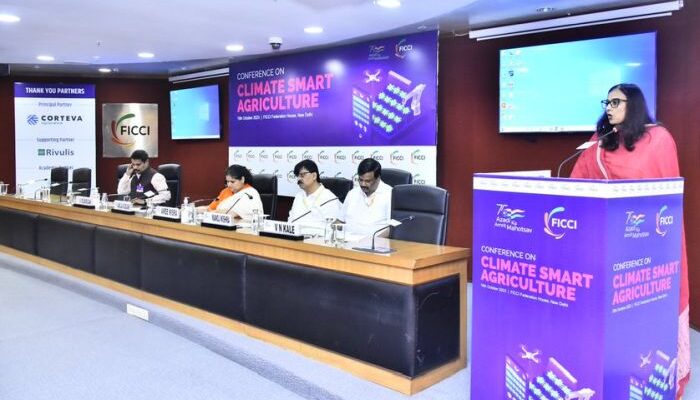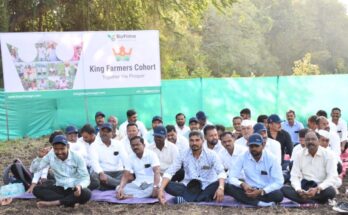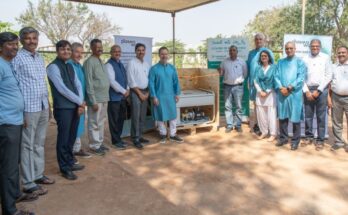New Delhi: To realise the vision of climate-smart agriculture, we must embrace climate-smart warehousing or green warehousing. It’s an essential building block for a sustainable and resilient agricultural future, Chairman, Warehousing Development and Regulatory Authority (WRDA), Department of Food and Public Distribution, Government of India, TK Manoj Kumar said today.
Addressing the conference on ‘Climate Smart Agriculture’ organised by FICCI, Kumar emphasised the importance of adopting green warehousing practices, in his address, Kumar said, “To achieve the goal of climate-smart agriculture, we must first ensure uniform and government-enforced standards across the warehousing sector. The Warehousing Development and Regulatory Authority (WDRA) plays a pivotal role in registering warehouses that issue negotiable warehouse receipts.” Kumar further emphasised that grain storage forms a vital link in climate-smart agriculture, ensuring efficient and sustainable storage practices, reducing waste, and safeguarding the environment for a resilient agricultural future.
You may also like to read: President of India launches the fourth Agriculture Road Map of Bihar
Dr VN Kale, Additional Commissioner (M&T), Ministry of Agriculture and Farmers Welfare, GoI said, “The government is deeply committed to promoting sustainable and climate-smart agriculture.” Highlighting the significance of farm mechanisation, Dr Kale stated that farm mechanisation plays an important role in promoting climate-smart agriculture. Without farm mechanisation, we can’t think about climate-resilient agriculture.
Dr Manoj Mishra, National Policy Advisor, FAO said, “The climate-smart agriculture has integration to food systems. An investment in climate-resilient agrifood systems drives enhancing solutions for climate-smart agriculture.”
Dr A Velmurugan, ADG (Soil & Water Management), ICAR said, “Any climate change technology that has to be inclusive, should be farmers oriented. We have to look out for the climate technologies starting from different varieties, different land management, and water use efficiencies.”
Amee Misra, Senior Economist and Head of Policy, UNDP India said, “If you look at Indian agriculture, more than 50 per cent of the population is either directly or indirectly involved or dependent on agriculture and any kind of climate variability or extreme events have consequences not just for agricultural production and productivity, but food security in the country as well.”
You may also like to read: Zydex Industries, Parul University ink MoU to introduce Bachelor’s and Master’s programs in Bio Farming
Speaking at the occasion, Anuja Kadian, Chair, FICCI Taskforce on Sustainable Agriculture and Government & Industry Affairs Director, Asia Pacific, Corteva Agriscience said, “Farmer-centric approach, impactful partnerships, and crop science innovation based on the predictable science-based ecosystem are crucial, at a time when India is championing sustainable agricultural development at the global stage.”
Dr Bharat Sharma, Scientist Emeritus (Water Resources), International Water Management Institute (IWMI) said, “In the fields of change, India sows the seeds of resilience with its climate-smart agriculture framework.”
Dr Ajeet Singh Nain, Professor & Director Research, Govind Ballabh Pant University of Agriculture & Technology (GBPUAT) said, “Sustainable agriculture cannot be achieved without climate-smart agriculture.”
“FICCI applauds the Government’s strong vision to achieve the SDG targets by 2030. This initiative is a testament to support this visionary approach. FICCI duly recognises that embracing climate-smart agricultural practices is a necessity and a strategic imperative to safeguard our agricultural sector against climate change impacts and fulfil our national and global sustainability commitments,” FICCI said.





